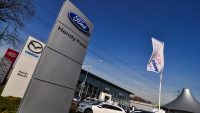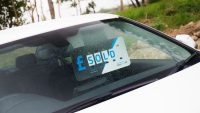Mercedes could be set to lose close to £2bn in Russian assets following a raft of new proposals put forward by Vladimir Putin’s government.
Russia’s governing Party – United Russia – put forward plans last week to nationalise assets owned by foreign companies from ‘unfriendly states’.
A government commission has now approved the first step of the plans, which would apply to firms more than 25 per cent owned by foreigners.
Mercedes has an estimated £1.9bn (€2.2bn) of assets in Russia which could fall foul of the new regulations.
Its interests in the country include a plant around 25 miles northwest of Moscow in the town of Esipovo.
Opened in 2019, Reuters reports that the factory employs over 1,000 people and builds E-class sedans and SUVs.
Building the state-of-the-art factory cost an eye-watering £250m (€300m) with plans to build 25,000 vehicles every year.
Mercedes recently warned that Russia’s invasion of Ukraine could cause disruption to production lines.
There were also fears raised about energy supply and even cyber attacks.
A Mercedes spokesman said: ‘These risks could be exacerbated by the potential expropriation of assets of Russian subsidiaries.’
How the automotive industry has reacted to Russia’s invasion of Ukraine
- Inchcape to drop Russian operations completely in wake of Ukraine invasion
- Toyota and Nissan boost humanitarian relief efforts in Ukraine with multi-million donations
- Tesla will pay Ukrainian staff for three months if they are called back to fight for their country
- Mobile mechanics prepare to drive coach of paramedics and nurses to Ukraine
- Car dealers face further new car delays as manufacturers announce factory closures
- Stellantis donates one million euros to help Ukrainian refugees and civilians fleeing from Russian invasion
- Car factories stall as war in Ukraine causes parts supply issues across region
- Jaguar Land Rover suspends car deliveries to Russia
- Volkswagen halts production at German plants due to difficulties getting parts from Ukrainian supplier
- Ukrainian wiring harnesses overtake semiconductors as Volkswagen’s biggest supply chain headache
































